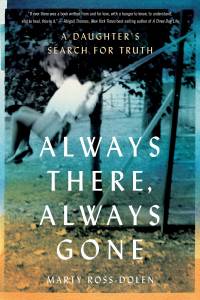Tethered by Loss, Lifted by Language
Hear the Conversation | Get the Book
 In Marty Ross-Dolen’s debut memoir Always There, Always Gone, the line between remembrance and reinvention is not merely blurred—it is lovingly stitched, unraveled, and re-woven in a luminous, genre-defying act of literary excavation. The book, an intricate hybrid of prose, poetry, photographs, and found materials, explores the silent legacy of generational grief following the 1960 mid-air collision that killed her maternal grandparents. Marty’s mother was only fourteen when the tragedy occurred. The grief that followed, long muted and unprocessed, seeped through the generations, shaping not only her mother’s interior world but her daughter’s as well.
In Marty Ross-Dolen’s debut memoir Always There, Always Gone, the line between remembrance and reinvention is not merely blurred—it is lovingly stitched, unraveled, and re-woven in a luminous, genre-defying act of literary excavation. The book, an intricate hybrid of prose, poetry, photographs, and found materials, explores the silent legacy of generational grief following the 1960 mid-air collision that killed her maternal grandparents. Marty’s mother was only fourteen when the tragedy occurred. The grief that followed, long muted and unprocessed, seeped through the generations, shaping not only her mother’s interior world but her daughter’s as well.
A retired child and adolescent psychiatrist with degrees from Wellesley and Albert Einstein College of Medicine, Marty brings a clinician’s insight and a poet’s ear to the excavation of her family’s unspoken wounds. “The writing process was a healing process,” she told me. “Am I healed? I don’t know. But I am a different person than the one who hadn’t written this book.”
The title—Always There, Always Gone—encapsulates this emotional duality: the haunting presence of absence. It also gestures toward the memoir’s core tension: the persistence of memory amid the vacuum left by sudden loss. What begins as a meditation on personal grief expands into a broader reflection on inherited trauma, silence, and the disjointed rituals of mourning that pervaded mid-century America. Her mother’s tragedy became the family’s shadow. “It became clear to me that this was not a topic to discuss,” Marty said of her childhood. “And so now in retrospect, I call it protracted mourning or protracted grief.”
Yet the memoir resists the straightforward grief narrative. It sidesteps catharsis in favor of collage, and instead of closure, Marty offers communion. Her grandmother’s voice—preserved in hundreds of letters spanning from adolescence to adulthood—emerges as the memoir’s spiritual anchor. “She writes beautifully,” Marty says, recalling the moment the letters shifted from artifacts to interlocutors. “She’s hilarious, witty, has a fantastic sense of humor. I know that she was a magnetic person.”
That magnetism compelled Marty not just to read the letters but to enter them. In moments of speculative nonfiction, she writes herself into scenes with her grandmother, inventing conversations, posing questions, and imagining herself seated across from the woman she never knew. “I started asking her questions and talking to her… it was a very painful process writing this book. And these surprises, these opportunities to play in the writing, were very fun.” It is here that the memoir transcends memoir—it becomes séance, dreamscape, and second chance.
There is a moment in the book that lingers long after the final page: Marty, confronting a particularly evocative letter, wonders whether her grandmother was happy with the decisions that led to her fate. “We all make life decisions that lead to our destinies,” she reflects. What begins as a search for meaning in tragedy becomes an affirmation of the choices her grandmother made—especially the decision to have five children, a subject this author had long wrestled with. “It became very clear to me that she loved having five children… she was thrilled with her role as a mom.”
This sense of reanimation—of giving the past breath and voice—is perhaps Always There, Always Gone’s most radical act. It resists the tidy arc of trauma-to-triumph that so often characterizes memoirs, choosing instead to dwell in the complexity of what remains. “I don’t believe that [grief] just disappears. It’s just whether or not it’s processed in a way that we can maybe think of it differently and move forward with a sense of peace.”
Her background in psychiatry is evident throughout the memoir, not in clinical detachment but in the clarity of her compassion. She writes like someone who has spent a lifetime listening—to children, to parents, to silence itself. And now, finally, to the voices of the dead.
Always There, Always Gone refuses categorization—equal parts memorial, memoir, and mosaic. In its form and function, it affirms the idea that healing isn’t a destination but an ongoing conversation with memory. Marty Ross-Dolen does not offer the reader resolution; instead, she offers presence. Her story becomes a shared space—an invitation to sit with what is gone and what still, miraculously, remains.
In her pages, absence sings. And somehow, impossibly, we hear it.

